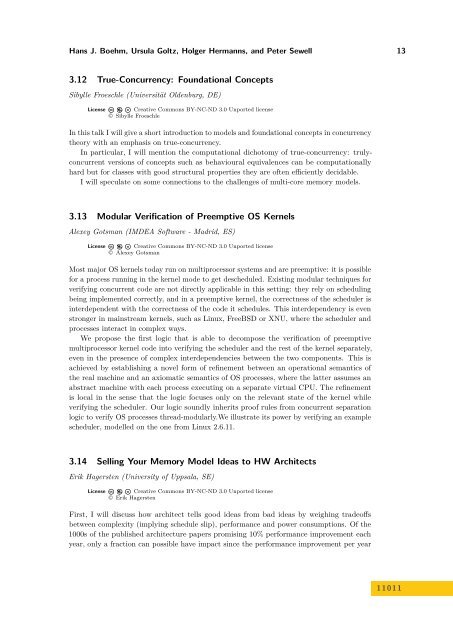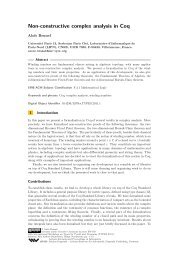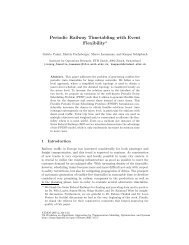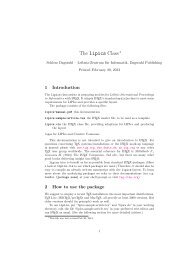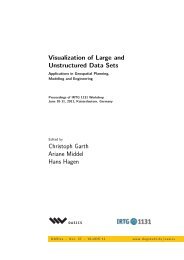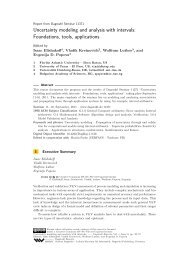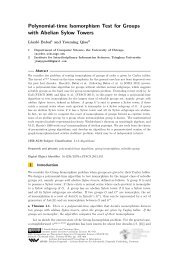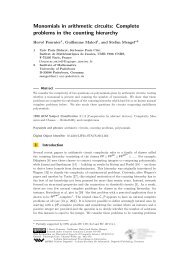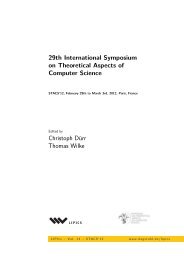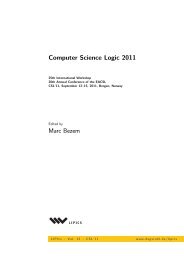Volume 1, Issue 1, January 2011 - DROPS - Schloss Dagstuhl
Volume 1, Issue 1, January 2011 - DROPS - Schloss Dagstuhl
Volume 1, Issue 1, January 2011 - DROPS - Schloss Dagstuhl
You also want an ePaper? Increase the reach of your titles
YUMPU automatically turns print PDFs into web optimized ePapers that Google loves.
Hans J. Boehm, Ursula Goltz, Holger Hermanns, and Peter Sewell 13<br />
3.12 True-Concurrency: Foundational Concepts<br />
Sibylle Froeschle (Universität Oldenburg, DE)<br />
License Creative Commons BY-NC-ND 3.0 Unported license<br />
© Sibylle Froeschle<br />
In this talk I will give a short introduction to models and foundational concepts in concurrency<br />
theory with an emphasis on true-concurrency.<br />
In particular, I will mention the computational dichotomy of true-concurrency: trulyconcurrent<br />
versions of concepts such as behavioural equivalences can be computationally<br />
hard but for classes with good structural properties they are often efficiently decidable.<br />
I will speculate on some connections to the challenges of multi-core memory models.<br />
3.13 Modular Verification of Preemptive OS Kernels<br />
Alexey Gotsman (IMDEA Software - Madrid, ES)<br />
License Creative Commons BY-NC-ND 3.0 Unported license<br />
© Alexey Gotsman<br />
Most major OS kernels today run on multiprocessor systems and are preemptive: it is possible<br />
for a process running in the kernel mode to get descheduled. Existing modular techniques for<br />
verifying concurrent code are not directly applicable in this setting: they rely on scheduling<br />
being implemented correctly, and in a preemptive kernel, the correctness of the scheduler is<br />
interdependent with the correctness of the code it schedules. This interdependency is even<br />
stronger in mainstream kernels, such as Linux, FreeBSD or XNU, where the scheduler and<br />
processes interact in complex ways.<br />
We propose the first logic that is able to decompose the verification of preemptive<br />
multiprocessor kernel code into verifying the scheduler and the rest of the kernel separately,<br />
even in the presence of complex interdependencies between the two components. This is<br />
achieved by establishing a novel form of refinement between an operational semantics of<br />
the real machine and an axiomatic semantics of OS processes, where the latter assumes an<br />
abstract machine with each process executing on a separate virtual CPU. The refinement<br />
is local in the sense that the logic focuses only on the relevant state of the kernel while<br />
verifying the scheduler. Our logic soundly inherits proof rules from concurrent separation<br />
logic to verify OS processes thread-modularly.We illustrate its power by verifying an example<br />
scheduler, modelled on the one from Linux 2.6.11.<br />
3.14 Selling Your Memory Model Ideas to HW Architects<br />
Erik Hagersten (University of Uppsala, SE)<br />
License Creative Commons BY-NC-ND 3.0 Unported license<br />
© Erik Hagersten<br />
First, I will discuss how architect tells good ideas from bad ideas by weighing tradeoffs<br />
between complexity (implying schedule slip), performance and power consumptions. Of the<br />
1000s of the published architecture papers promising 10% performance improvement each<br />
year, only a fraction can possible have impact since the performance improvement per year<br />
1 1 0 1 1


